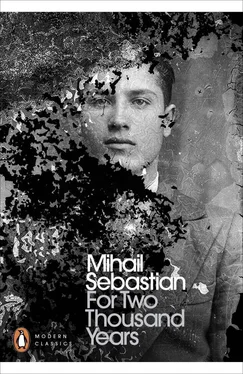I realize, as though in the wake of a storm, that the same winds buffeted us both and that we were being wrecked in the same sinking vessel. It’s easy to cry ‘Hooligans’, and very convenient. It’s almost as simple as ‘Down with the Yids’. Is that all there was to our little drama?
Back then I guessed there was something else to it. Now I’m sure of it. But it’s got nothing to do with a natural bandit like Marin Dronţu. It concerns Pârlea. Marin Dronţu flailing about with his cudgel is irrelevant. He’s just a demonstrator. Pârlea is a more serious case and, with him in mind, I wonder if it is always easier to be a hooligan than a victim. I have no doubt that Pârlea has suffered greatly through the path he has taken. His political nihilism, his innocent revolts and his formidable imprecations perhaps show puerility of thought, but what is interesting is not their quality, but his sincerity in living them, the passion he submits them to. It goes without saying, when someone is beating your head with a stick, it’s all the same to you whether he’s a bandit or a hero, and I won’t get so precious about it as to declare I’d prefer to be killed by an ideological revolver than by an illiterate one.
Though I can see my personal situation as being just as bad either way, I can still allow myself to reflect a little on my aggressor. Well, in the case of Ştefan Pârlea, I don’t envy him at all. Student unrest was for me perhaps a tragedy, but it was for him too. I provoked him one evening into speaking about his role in the movement. He replied with deliberate harshness.
‘I’m not sorry about what happened. I’m sorry about how it ended: in indifference, in forgetting … Smashing windows is fine. Any act of violence is good. “Down with the Yids” is idiotic, agreed! But what does it matter? The point is to shake the country up a bit. Begin with the Jews — if there’s no other way. But finish higher up, with a general conflagration, with an all-consuming earthquake. That was our ambition back then, our real aspiration. But I for one have not finished. I’ll suffocate if nothing new happens.’
Perhaps Ştefan Pârlea is being poetic, with his symbols and myths, but in fact this tumult is for him a form of political thought. Who can guarantee that S.T. Haim’s ideas and calculations are closer to the truth than Ştefan Pârlea’s visions? What I find refreshing in this fellow is his total incapacity for schematic thought. His thinking is a flash-flood that demolishes, overturns and embraces, without method or criteria, according to the rhythms of his frenetic outbursts. I can trace in his habitual vocabulary a number of terms that he has never properly clarified, either in writing or speech, but which have some magical significance for him. He’d probably find it difficult to say exactly what is meant by the ‘barbarian invasion’ he calls for, or by ‘the seeds of fire’ he says lie latent in each of us, and which we need to blow into mighty blazes. It’s all so vague and inconsistent as to sometimes seem ridiculous … Yet Ştefan Pârlea passes from words to action with utter commitment. His departure from the university, for example, which came as an immense relief to everyone as, with a little patience, he would have been a lecturer within a few years, was not permitted to be a mere departure.
‘The only thing I can do for the university is burn it down,’ is what he is said to have written to the dean in an explanatory letter.
Even if this was what he really wrote, I still don’t see what the fuss was about. The recklessness of youth. A poor person has to compensate internally for poverty by slamming a few doors. Otherwise he’ll never learn to open life’s big doors. Pârlea’s abandonment of university was certainly a piece of nonsense, but I tell myself it was a healthy one. Or could have been.
But it turned out otherwise. And other pieces of foolishness followed, some were harder to explain than others. I confess that his escapade at Records is beyond me. Sub-archivist at the Ministry of Records? Perhaps. Perhaps, though, it’s stupid to accept such a low-ranking, badly paid and menial job when you could have been a professor or the editor of a big magazine. And, once finding yourself there, to continue experimenting with self-mutilation seems like childish play-acting.
In September he was listed for promotion; he would have received a higher salary and have been moved to the central office. He turned it down. He just returned the difference in money to the cashier, saying he wouldn’t accept a penny over 3,300 lei. ‘He’s crazy,’ they said at the ministry three days later, where the news passed from office to office, from person to person. The General Secretary called him to his office, in order to take a look at ‘the man who turns down money’.
‘Are you in your right mind, good man?’
‘I believe so,’ replied Pârlea, without further explanation.
But he erupted that evening, among us, when I reproached him for performing experiments ‘ pour épater les bourgeois ’.
‘You turned down 1,200 lei in exchange for the chance to astound a ministry of 600 people. That’s 2 lei per person. Never has a reputation been bought so cheaply.’
‘You’re fools. What did you want me to do? To receive an extra 1,000 lei today, another 1,000 next year? To be sub-archivist today, next year head archivist, main archivist, general archivist? Is that why I escaped from where I escaped from? Don’t you see that any job you accept from this state implies complicity? That every success in this culture is a betrayal? I want to demolish. I want to burn down. And to do this I have to keep my hands free. I don’t want to have anything to cling to, anything to lose, anything to protect. Nothing to hold me back on the day everything gets fed to the grinder. You accept a lectureship with the idea of working, and one day find that the 15,000 lei they give you are indispensable, that along with them you’ve created needs, imposed obligations on yourself. The habits you acquire end up choking you, paralysing you. You become prudent, cowardly, grow old. The great perfidy of the order we live in is that it makes us its unconscious servants. And it buys us cheaply, by stealth. You know, I look at you and it scares me. Scares me. You’ve all got your own little affairs, your own little things going on, your own little arrangements. Your wasted years disgust me. I wish you’d get pot bellies faster, that your hair would hurry up and fall out, once and for all. The great conflagration is coming without you, it doesn’t need you, it doesn’t burn in your hearts …’
What I find interesting about Pârlea’s problem is that its origin lies in the movement of 1923. What remains from those years is not only the bloodied heads, the careers that were made and a steady engagement with anti-Semitism, but also a revolutionary spirit, a seed of a sincere rebellion against the world in which we live. This seed of revolution couldn’t be seen from our unfortunate dormitory in Văcăreşti, but my unhappy memories are perhaps not the only testimony capable of shedding light on those years. Certainly no one is going to blame me for this, as you can’t expect exercises in moral objectivity or a dissertation on higher reasoning from someone who gets beaten perhaps twice a week, on average. Being persecuted is not just a physical trial. It is one that affects you intellectually. The reality of it slowly deforms you and attacks, above all, your sense of proportion. Now is not the moment to reproach myself for being slow to understand my assailants. That would be a belated and grotesque excess of objectivity. But I’m glad that times have changed in such a way that I can meditate in peace on the justifications for the beatings. The role of martyr has never sat entirely well with me, though I recognize in myself enough of a tendency towards this peculiarly Jewish occupation.
Читать дальше












